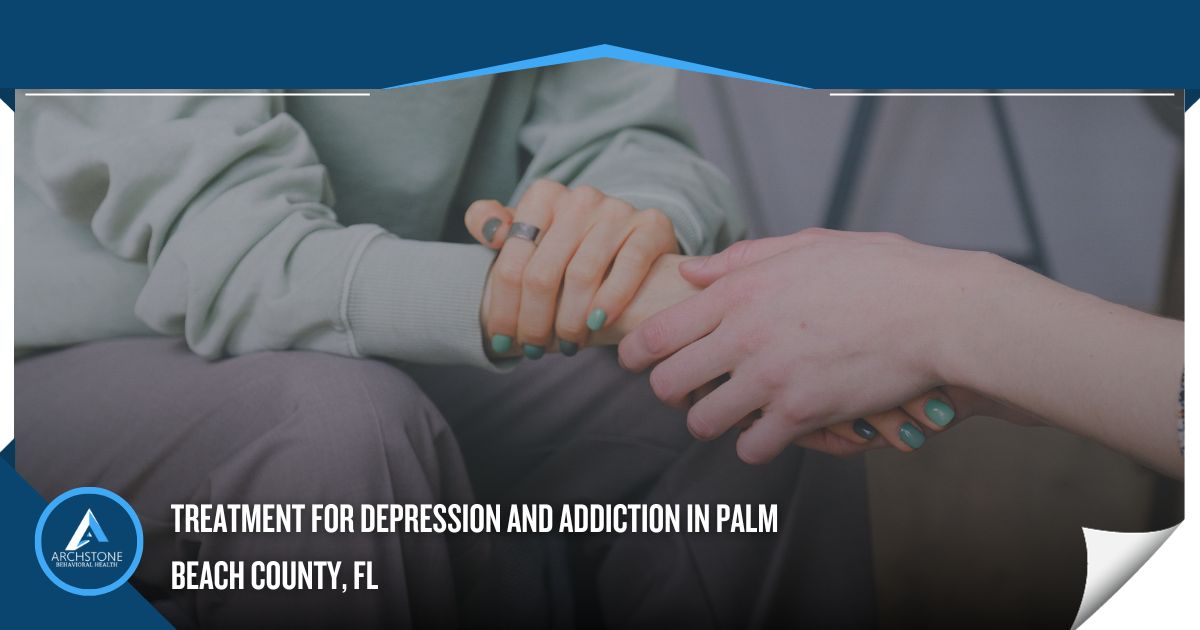Treatment for Depression and Addiction in Palm Beach County
Get Help Now

While some people develop a substance use disorder due to environmental or genetic reasons, many individuals begin relying on drugs or alcohol to cope with an untreated mental health condition. When you have a mental illness and addiction at the same time, this is known as having co-occurring disorders.
The Substance Abuse and Mental Health Services Administration (SAMHSA) reports that 9.2 million adults have co-occurring disorders in the United States.[2]
One of the most common mental illnesses to co-occur with addiction is depression. Depression can lead to addiction, but it can also develop alongside addiction. Regardless of which came first, a dual diagnosis program in Palm Beach County can provide comprehensive treatment for both depression and addiction.
Is There a Connection Between Depression and Addiction?
Depression and addiction are connected in two different ways. First, someone with a depressive disorder might begin to abuse drugs or alcohol to cope with their symptoms, leading to the development of a substance use disorder. On the other hand, people with addiction are more prone to experiencing depression because of the way drugs and alcohol affect their brain chemistry.
Studies show that more than 16.5% of people with depression suffered from an alcohol use disorder while 18% dealt with drug addiction.[3]
When you have co-occurring depression and addiction the symptoms of each illness can exacerbate one another. While your addiction worsens, so do the symptoms of your depression and vice versa. As a result, you should always seek help for both conditions at the same time.
How is Depression and Addiction Treated in Palm Beach County?
Co-occurring depression and addiction must be treated simultaneously to prevent relapses from happening.. By attending a dual diagnosis treatment program in Palm Beach County, you can learn to manage both of your illnesses healthily.
During treatment for depression and addiction in Palm Beach County, you can expect:
Assessment and Diagnosis
When you arrive at a dual diagnosis treatment center you will undergo an initial assessment and diagnosis process. Not only is this designed to determine what depressive disorder you struggle with, but the information gathered during the assessment is used to create an individualized treatment plan. As a result, all of the services and treatments you engage in will be specifically tailored to your needs.
Medical Detox
After you complete the assessments you will begin medical detox, the first step in recovering from addiction. The method of detox used will depend on what type of substances you were abusing. For example, opioid withdrawal may be treated using Suboxone or methadone while alcohol withdrawal is typically managed with a benzodiazepine taper.
The goal of detox is to provide treatments and medications that soothe your withdrawal symptoms, prevent cravings, and keep you medically stable while your body adjusts to the presence of the substance you were addicted to.
Evidence-Based Therapy
After detox is over you will begin participating in therapies that are proven effective in helping treat depression and addiction. Additionally, you will have the ability to participate in both individual therapy and group counseling. The type and amount of therapy you receive will be based on your needs and goals for treatment.
Examples of evidence-based therapies for depression and addiction include:[4,5]
- Cognitive-behavioral therapy (CBT)
- Interpersonal therapy (IPT)
- Supportive therapy (ST)
- Psychoeducational intervention (PEI)
- Contingency management (CM)
- Motivational interviewing (MI)
- 12-step facilitation therapy
- Family behavior therapy
- The matrix model
Medication Management
Sometimes dual diagnosis treatment centers in Palm Beach County will use medications to manage the severe symptoms of depression while you engage in therapy. As a result, you will be better able to focus on recovering. How long you stay on depression medication will depend on your personal needs.
Examples of medications used to treat depression include:
- Selective serotonin reuptake inhibitors (SSRIs)
- Serotonin-norepinephrine reuptake inhibitors (SNRIs)
- Tricyclic antidepressants (TCAs)
- Serotonin antagonists and reuptake inhibitors (SARIs)
- Monoamine oxidase inhibitors (MAOIs)
Aftercare Services
Lastly, recovery does not end when you complete a treatment program. Aftercare services can assist you in continuing to develop skills and manage your condition after you graduate from a facility.
Examples of aftercare services offered in Palm Beach County include:
- Continued therapy and group counseling
- Medication management services
- Access to alumni support groups
- Referrals to outpatient or sober living programs
- Recommendations on local support groups to attend
- Case management services like vocational, housing, medical, or legal assistance
Find Treatment for Depression and Addiction in Palm Beach County
If you or a loved one suffers from co-occurring depression and addiction, it’s time to seek help. Dealing with these conditions can be extremely difficult, making it nearly impossible to cope with everyday life. Thankfully, dual diagnosis rehab centers like Archstone Behavioral Health can provide you with the support and tools you need to regain control over your life.
To learn more about our comprehensive dual diagnosis treatment programs in Palm Beach County, please contact us today.
References:
- The U.S. Department of Health and Human Services (HHS): SAMHSA Announces National Survey on Drug Use and Health (NSDUH) Results Detailing Mental Illness and Substance Use Levels in 2021, Retrieved September 2023 From https://www.hhs.gov/about/news/2023/01/04/samhsa-announces-national-survey-drug-use-health-results-detailing-mental-illness-substance-use-levels-2021.html
- The Substance Abuse and Mental Health Services Administration (SAMHSA): Co-Occurring Disorders and Other Health Conditions, Retrieved September 2023 From https://www.samhsa.gov/medications-substance-use-disorders/medications-counseling-related-conditions/co-occurring-disorders
- The National Library of Medicine (NLM): Mood Disorders and Substance Use Disorder, Retrieved September 2023 From https://www.ncbi.nlm.nih.gov/pmc/articles/PMC2851027/
- The National Library of Medicine (NLM): Major depressive disorder: Validated treatments and future challenges, Retrieved September 2023 From https://www.ncbi.nlm.nih.gov/pmc/articles/PMC8610877/
- The National Library of Medicine (NLM): Evidence-based practices for substance use disorders, Retrieved September 2023 From https://www.ncbi.nlm.nih.gov/pmc/articles/PMC3678283/